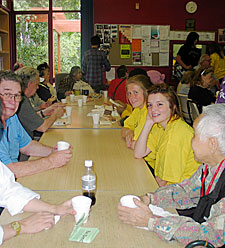170 Year Nine students from William Clarke College have swapped their homes in the Hills for three days roughing it in Sydney's CBD this week.
The teens’ stay in the big smoke has been part of a City Mission Program, designed to see the students actively engaging with the city's poor and disadvantaged.
Organised by Anglican Youthworks, this new high school initiative has been designed to go beyond the usual excursion experience and help young students engage directly with issues of poverty as well as develop urban independence skills.
 “We’ve been thinking of how we could get students to have a better understanding of the experience of people who are less fortunate than them", says Trish Thompson, Dean of the Senior School at William Clarke College. "So we arranged with Anglican Youthworks an excursion which is more effective than someone simply coming to the college to speak”.
“We’ve been thinking of how we could get students to have a better understanding of the experience of people who are less fortunate than them", says Trish Thompson, Dean of the Senior School at William Clarke College. "So we arranged with Anglican Youthworks an excursion which is more effective than someone simply coming to the college to speak”.
From Monday 24th to Wednesday 26th, 12 student groups " each supervised by a schoolteacher and an Anglican Youthworks staff member or Year 13 Youthworks Gap Year graduate " stayed overnight in youth hostels near Central Station and Town Hall.
During the days, the groups partnered with city welfare organisations to serve in youth refuges, men's and women's shelters, an injection centre, an outreach café, a seniors' home and a soup kitchen.
"Visiting these sorts of places gives the students an opportunity to engage with real life issues outside of their normal experiences", says Anglican Youthworks’ director of programs, Jeff Mann.
"Our hope is that it helps them come to terms with the inequities in our society and how they can be a part of the future solution."
In order to develop independence skills, the students were also required to cook their own meals each day " including "tight Tuesday' which required planning, purchasing and preparing meals on a low budget of $6.50 per person for the day.
Life lessons hit home
Budgeting their own money, whilst simultaneously meeting many urban disadvantaged residents, has appeared to be an effective way of helping the students empathise with how others live.
"We understand better now just how difficult it is to live on a low income”, said one student. "When we get back to school, we may be able to arrange some fundraising within our grade to help these people".
The final element of the program was an urban navigation race which required the students to use GPS systems, public transport and maps to make their way around the city during the three days and complete a variety of poverty-related challenges such as creating a makeshift cardboard shelter in a park.
"We are very fortunate to be able to work so positively with some of the city's best welfare organisations, and to have the permission from the students' parents to do so", says Mr Mann.
"This week's program has been very positive and Anglican Youthworks views this as an example of many future holistic learning experiences we would like to provide for Sydney schools".

























